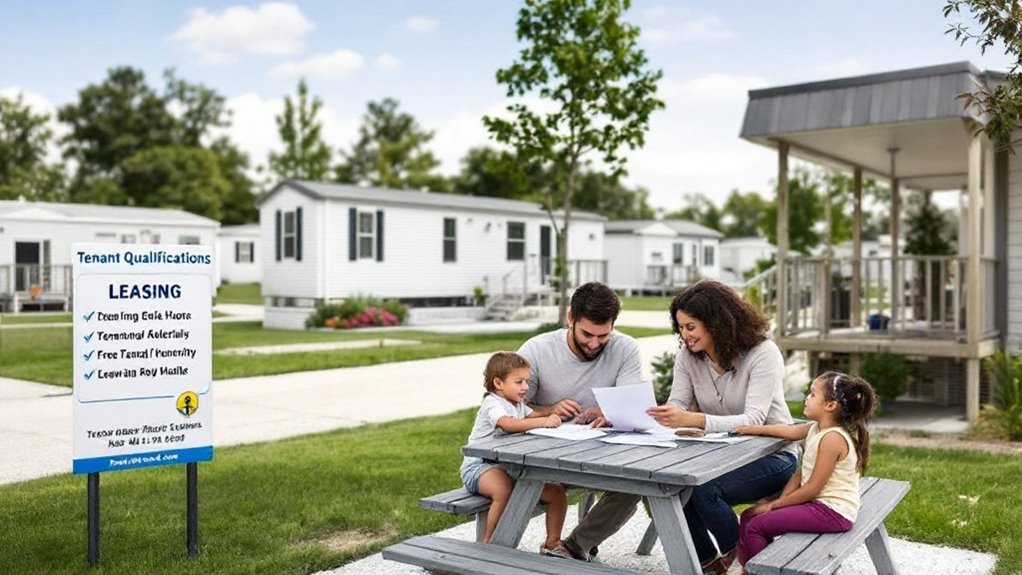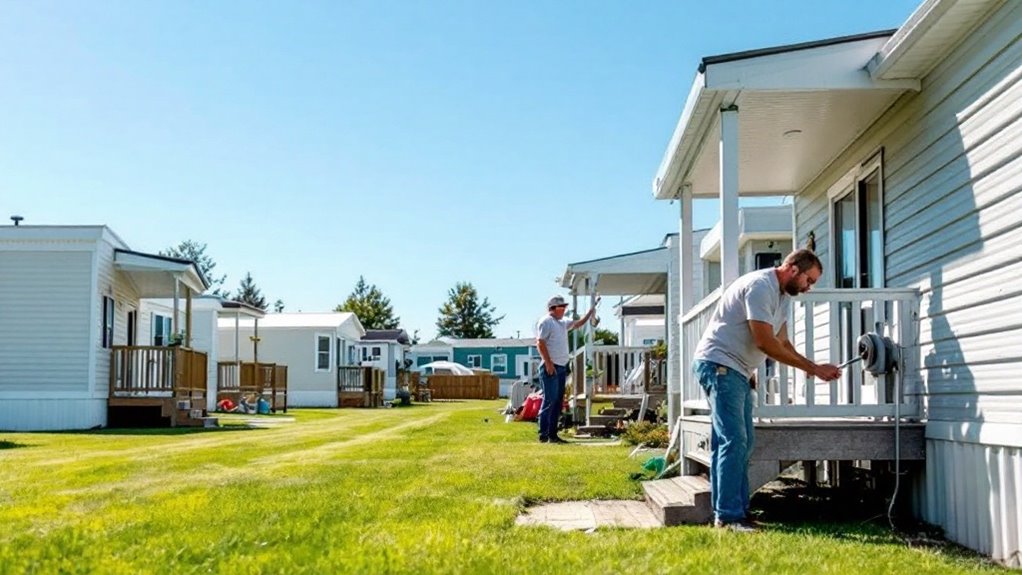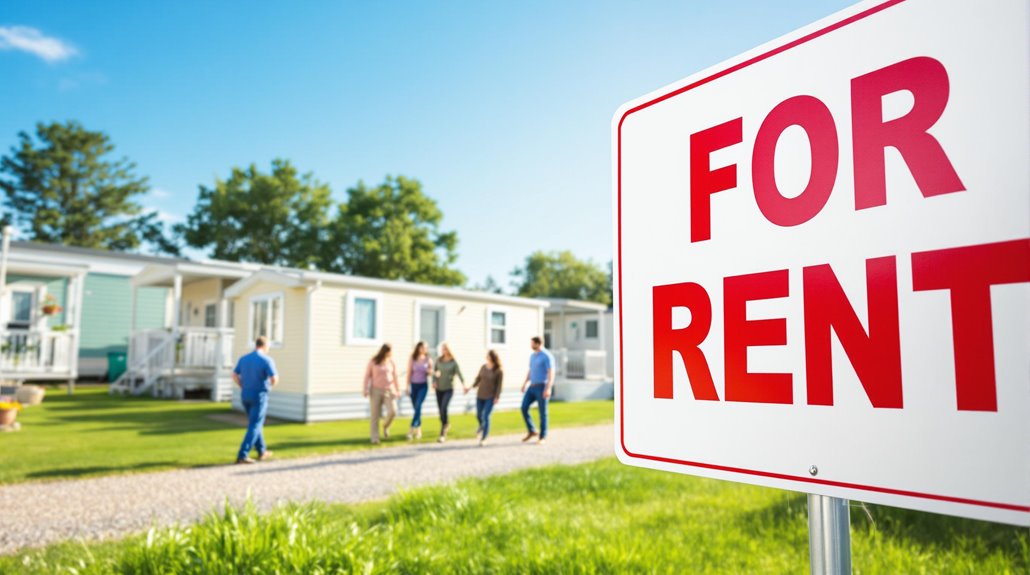Can you rent mobile homes, YES!, and they’re a flexible, cost-effective housing option. Mobile home rentals are available in standalone units or within parks, often with community amenities like pools and playgrounds. You’ll typically need proof of income, a decent credit score, and a security deposit to qualify. Lease terms usually last at least two years, and you’re responsible for utilities and some maintenance. Rent-to-own options are also available if you’re considering future ownership. Mobile homes often come fully equipped, saving you time and money. Explore further to uncover more details about this practical living solution.
Key Takeaways
- Mobile homes can be rented, offering lower upfront costs and flexible rental terms compared to traditional homes.
- Rentals include single-family mobile homes, park rentals, and rent-to-own options, catering to various budgets and preferences.
- Tenants must meet qualifications like proof of income, credit score checks, and may need to pay security deposits or pet fees.
- Lease agreements typically require a minimum two-year term and outline utility responsibilities, maintenance, and pet policies.
- Renting mobile homes provides access to community amenities and is a cost-effective alternative to standard rental properties.
Benefits of Renting Mobile Homes
Renting a mobile home can be a practical and cost-effective housing solution, especially if you’re looking to avoid the high upfront costs of buying a home. Mobile home rentals often come with lower upfront costs, making them one of the most accessible affordable housing solutions available. You can move in without additional purchases, as many rentals include fully equipped appliances, saving you both time and money.
Flexible lease terms are another advantage of renting mobile homes. These agreements can cater to your specific needs, whether you’re looking for a short-term arrangement or a longer commitment. Some landlords even offer rent-to-own options, allowing you to shift into homeownership while living in the property. This flexibility gives you the opportunity to assess your long-term housing needs without feeling locked into a permanent decision.
Living in mobile home communities also provides access to communal amenities, such as pools, playgrounds, and recreational areas. These shared spaces can enhance your quality of life and foster a sense of community. Additionally, renting allows you to test a neighborhood and living situation before making a purchase, giving you valuable insight into whether the area meets your lifestyle and preferences. Understanding tenant demographics can help you align your rental choices with the needs of your target market, ensuring a better fit for both landlords and renters. Overall, renting a mobile home offers a blend of affordability, convenience, and flexibility that can suit a variety of housing needs.
Types of Mobile Home Rentals Available
When considering mobile home rentals, you’ll find a variety of options to suit different needs and budgets. Mobile homes, also known as manufactured homes, offer flexible rental opportunities that cater to a wide range of preferences. Whether you’re looking for an affordable price or a more modern living space, there’s likely a rental option that fits your requirements.
- Single-Family Mobile Homes: These standalone units are ideal if you prefer privacy and independence. In Houston, you can find single-family mobile homes for rent at prices ranging from $575 for smaller units to $1,399 for larger, more spacious models. Many come equipped with modern appliances, making them comfortable and convenient.
- Mobile Home Park Rentals: If you’re interested in community living, renting in a mobile home park might be a great choice. These parks often provide amenities like playgrounds, pools, and communal spaces. Lease agreements typically require a minimum two-year commitment, with a security deposit equal to one month’s rent.
- Rent-to-Own Options: For those considering homeownership, rent-to-own mobile homes offer a pathway to eventually purchase the property. This option allows you to rent the home while building equity, making it an appealing choice for long-term planning.
Whether you’re drawn to the affordability of manufactured homes or the convenience of modern appliances, mobile home rentals provide diverse options to meet your needs.
Tenant Qualifications and Requirements

To secure a mobile home rental, you’ll need to meet specific qualifications and provide necessary documentation. Tenant qualifications typically include proof of income, which must be at least three times the monthly rent. This guarantees you can comfortably afford the rental payments. Your credit score also plays a significant role; a minimum FICO score of 599 is required. If your credit score meets this threshold, you’ll need to provide the first month’s rent and a security deposit in certified funds. However, if your credit score is 598 or lower, you’ll need to pay the first month’s rent and double the security deposit.
If you have pets, they may be accepted on a case-by-case basis, but you’ll need to pay a $500 non-refundable deposit per pet. Additionally, if pets are allowed, you must obtain renters insurance with liability coverage to protect against potential damages or incidents. This requirement guarantees both you and the property owner are safeguarded. Utilizing tenant screening solutions can help property owners verify your financial reliability and rental history, ensuring a smoother application process.
Meeting these tenant qualifications is essential to securing a mobile home rental. Be prepared to provide proof of income, verify your credit score, and understand the financial obligations, such as the security deposit and any additional fees for pets. Renters insurance with liability coverage is a must if you plan to have pets in your mobile home. By fulfilling these requirements, you can move forward with renting a mobile home that suits your needs.
Understanding Lease Agreements and Terms
While renting a mobile home, it’s crucial to thoroughly review the lease agreement, as it outlines the terms and conditions of your tenancy. Mobile home leases typically require a minimum rental term of two years, with a security deposit equal to the monthly rent due upon signing. You’ll also need to provide proof of income, usually at least three times the monthly rent, to meet tenant qualifications. Lease agreements often specify that you’re responsible for all utilities, so factor these costs into your budget. Consider exploring rent-to-own agreements if you’re interested in eventually owning the property, as they can provide a pathway to ownership with lower upfront costs.
Here are three key elements to look for in your lease agreement:
- Rental Term and Security Deposit: Confirm the length of the rental term and the amount of the security deposit. This deposit is often refundable, provided you meet all lease conditions.
- Pet Policies and Maintenance Responsibilities: Check for any pet policies, including non-refundable deposits or restrictions. Additionally, clarify maintenance responsibilities, such as appliance upkeep or landscaping.
- Option to Purchase: If you’re interested in eventually owning the mobile home, verify the lease includes an option to purchase. This clause outlines the terms and conditions for shifting from renting to owning.
Maintenance and Utility Responsibilities

Renting a mobile home often means taking on maintenance and utility responsibilities, as outlined in your lease agreement. As a tenant, you’ll typically pay for all utilities, including electricity, water, and gas, unless specified otherwise. Most rental properties don’t include appliances, so you’re responsible for maintaining any items you provide. Landlords generally won’t cover repairs or replacements for these, so understanding your lease terms is essential.
You’ll also handle the upkeep of the mobile home, ensuring it stays in good condition. This includes routine maintenance practices like checking for leaks, cleaning gutters, and inspecting HVAC systems. Seasonal maintenance checklists, often provided by landlords or community guidelines, can help you stay on top of these tasks. Proper upkeep not only preserves the home’s condition but also prevents costly repairs.
Texas law protects tenants by prohibiting landlords from cutting off essential utilities without cause, even if disputes arise. However, your lease agreement may include specific clauses about utility responsibilities, so review it carefully. If you’re unsure about maintenance or utility expectations, clarify them with your landlord before signing. Using a long-term rental CRM system can help streamline communication with your landlord and ensure all maintenance requests are tracked efficiently.
Conclusion
So, you’ve decided to rent a mobile home—congrats on embracing the pinnacle of minimalist chic! Whether you’re dodging sky-high rents or just love the thrill of wheels under your living room, remember: it’s not just a home, it’s a lifestyle. Just don’t forget to read the fine print, because nothing says “adulting” like arguing over who fixes the leaky roof. Happy trails, and may your neighbors be quiet and your utilities affordable.




